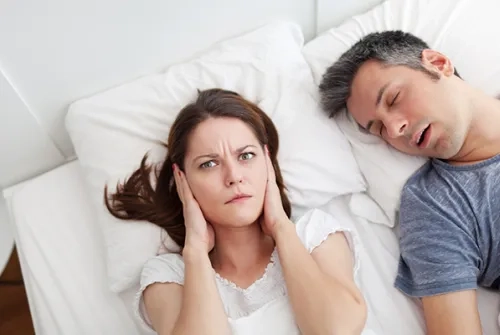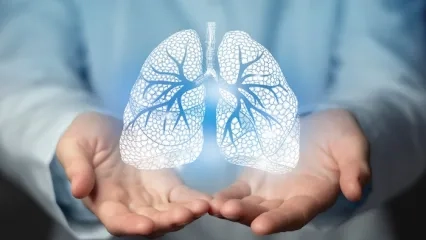Alo Yeditepe
Alo Yeditepe
Snoring and Its Treatment
Snoring, whether mild or severe, is not only a health problem; it can become a social wound that negatively affects bilateral relationships and family life. We talked to those who did not realize that they were snoring, who were aware but did not care, and who even listened to their spouse's snoring as a lullaby for years. So, what is the cure for snoring? Yeditepe University Koşuyolu Hospital Chest Diseases Specialist Asst. Prof. Dr. Seha Akduman explains.
Men Are About Twice as Likely to Snore as Women. Is this true and if so, why?
Snoring is the noisy sounds made by the tongue root cavity and the pharyngeal region as they pass through the area, which allows the air to pass into the lungs during sleep. 10% of women experience snoring before menopause and 40% after. The reason for this variability is that hormones increase the rate of fat deposition in the body and reduce muscle strength. When premenopausal women and men are compared, the neck circumference is thickened and due to the increase in fat tissue, it is observed that men snore more than women. According to the American Sleep Academy, about 40% of adult men snore and about 24% of adult women snore. However, it is also known that after the age of 40, the likelihood of men snoring increases.
It is considered the difference in upper respiratory tract anatomy of men may be effective in this difference between genders. The muscles in the pharyngeal area behind the nose and oral cavity relax during sleep. In the meantime, our tongue fills the void. Therefore, depending on the anatomical structure of the person, the larger this gap, the more likely it is to snore.
What Is the Connection Between Weight and Snoring?
Snoring, sleep apnea, and obesity. This triad affects each other in a way that creates a vicious circle. That is, about 80%percent of obese people have sleep apnea. About 90% of those who experience sleep apnea also snore. Sleep apnea is a risky disease that progresses with symptoms such as stopped breathing in sleep and lack of oxygen. Obesity is the biggest risk factor for sleep apnea, while sleep apnea is also a risk factor for obesity. Therefore, we are talking about two important problems that cause the problem to grow in a vicious circle that affects each other. Patients cannot go to deep sleep because they wake up many times during the night due to stopping breathing during sleep. The patient cannot sleep as soon as he lies down and consequently cannot get enough rest. This disintegrating sleep cycle ultimately has serious metabolic consequences, from cardiovascular disease to diabetes. The heart, brain, and lungs cannot be rested due to the person's inability to get quality sleep. Since oxygen is low in the body, the patient becomes weak, tired, and unhappy during the day. As a result, it turns to carbohydrate-rich foods. Less and poor quality sleep causes the person to turn to more junk food. Eventually, he begins to gain weight. In other words, the most important cause and effect of sleep apnea is obesity.
Of course, this does not mean that only overweight people will snore. Sometimes very weak people can also snore due to excess adipose tissue around the neck or throat. Nevertheless, it is possible to say that losing weight is effective in both snoring and getting rid of sleep apnea.
Can a Change in the Lying Position Solve the Problem of Snoring?
In polysomnography, which we call the sleep test, the relationship between snoring-apnea of the sleeping position is also examined. The supine position increases snoring. There are special groups in that apnea occurs only when lying on the back. The patient who has apnea only while lying on his back is diagnosed with ‘positional apnea'. And in these groups, some methods are used to disrupt the comfort of lying on your back. Treatment is started to force the tennis ball to lie on its side while sleeping behind its pajamas so that it cannot lie on its back during the night.
Does Breathing Stop When Snoring? Is it Dangerous?
People with apnea under snoring may experience respiratory arrest. Sleep apnea means at least 10 seconds of respiratory arrest during apnea, during which time oxygen levels also decrease. The most dangerous part of sleep apnea is the decrease in these oxygen levels and the related deterioration of all metabolisms.
Initially, slight levels of weakness during the day, and headache may be seen as a lack of attention. The higher the apnea/hypopnea index, the higher the complaints and the more dangerous they become. Individuals with sleep apnea don't just risk their own lives. It is a health problem that also affects society by causing traffic accidents and occupational accidents.
Does Every Loud Sleeper Have Sleep Apnea? What Other Symptoms?
Loud snoring is the most important symptom of sleep apnea. Research shows that 90% of people who snore have sleep apnea. Moreover, waking up panting at night during sleep, shortness of breath that requires a person to wake up during sleep, insomnia experienced the next day due to poor quality sleep, distraction, morning headache, dry mouth, and being more irritable during the day are among the symptoms of sleep apnea.
Since the body cannot rest during sleep due to sleep apnea, insulin resistance, oxygen in sleep and heart rhythm deteriorate during that day. And so, the patient develops metabolic syndrome. The main cause of many diseases with blood pressure, diabetes, and metabolic syndrome is actually sleep apnea. Therefore, although snoring is an important marker for sleep apnea, if there is one or more of the other symptoms, considering that not everyone who has this problem snores, a physician should be consulted.
How Can People Sleeping Alone Check If They Snore or Not?
If snoring does not disrupt a person's sleep patterns and no one is with him/her, it can be very difficult to notice. However, if there are complaints related to poor quality sleep the next day, they may think that they are snoring. In this case, they may ask someone else to observe them. Or he can record himself during the night and see his sleep patterns and check whether he snores or not.
Can Daily Language Exercises Cure the Problem of Snoring? Can you tell us a little about these exercises?
The main problem with snoring is the relaxation of the muscles. Increased fat disrupts muscle relaxation and contraction. And the muscle tissue that keeps the airway open becomes dysfunctional, closing the airway passage. Therefore, language exercises have nothing to do with snoring. The most effective thing is to lose weight from fat by protecting the muscles.
About
Faculty and Year of Graduation:
Gazi University Faculty of Medicine, 2007
”
See Also
- How to Cleanse Your Lungs?
- Is Breathing Air Dangerous in Fires?
- What is Electronic Cigarette Disease (EVALI)? EVALI Symptoms and Treatment
- What is COPD? Symptoms and Treatment of COPD
- Long Journeys Increase the Risk of Embolism!
- What Asthma and COPD Patients Should Pay Attention to When Using Air Conditioning!
- What is Allergy? What are the Symptoms of Allergy?
- What is Desert Dust? Harms of Desert Dust
- What is Tuberculosis (TB)? Symptoms and Treatment
- Circadian Rhythm Disorder
- Lung Cancer Screening Age
- What is Good for Cough? How to Cure Cough?
- Lung Cancer Symptoms and Treatment
- 10 Ways to Have a Sound Sleep in the Heat
- What Should Asthma Patients Be Cautious About?
- Does Poor Quality Sleep Increase The Risk of Asthma?
- What is Allergy? What are Allergy Symptoms?
- What Causes Insomnia, Diagnosis and Treatment
- 9 Common Misconceptions About COPD
- Causes, Symptoms, and Treatment of Asthma
- COPD Makes You Age Early
- Allergy and Asthma During Pregnancy
- It Is Aimed to Eliminate Tuberculosis Worldwide By 2030
- Pollen is Now Seen Outside of Seasonal Changes
- Do Dental Caries Increase the Risk of Pneumonia?
- Lung Patients Should Not Stop Their Medications
- Smoking Rates Under the Age of 15 Are Increasing
- Inhaling Electronic Cigarettes for a Few Minutes Causes Damage to Vein Wall
- 4 Significant Preliminary Symptoms of Lung Cancer
- People Who Smoke More Than 25 Cigarettes a Day Have a 50-fold Increased Risk of Lung Cancer
- How Does Acid Rain Affect Human Health?
- Can Back Pain Be A Sign of Lung Cancer?
- Nine Out of Ten COPD Patients Do Not Know They Are Sick
- The Slowing Traffic in Istanbul Increases the Risk of Cancer!
- The American Cancer Society Has Announced; The Age of Screening For Lung Cancer Has Decreased
- Hidden Lung Cancer Cases Revealed in Tomographs Taken Due to Coronavirus
- Quitting Smoking Even After Diagnosing Lung Cancer Effects Lifespan
- Electronic Cigarettes Can Cause Heart Attacks!
- Pollen Allergy Has No Season
- Beware of Little-Known Risks of Smoking!
- Obesity is Both a Cause and Consequence of Sleep Apnea
- Asthma and COPD Attack Season Begins
- Lung Cancer
- Does the Pneumonia Vaccine Protect Against the Coronavirus?
- In Case You Are Unable To Sleep Even If You Are Tired, Your Circadian Rhythm May Be Disrupted
- Using Antipyretics Uncontrolled Can Hide Pneumonia Symptoms
Alo Yeditepe





